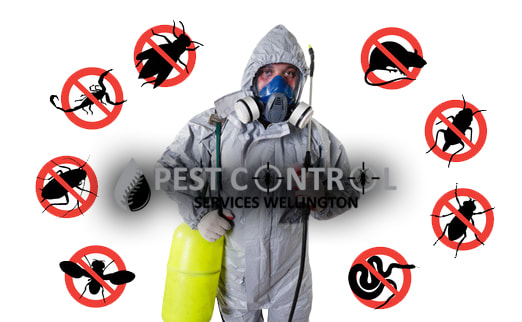Pest Control Clovis Done Right: Specialist and Reliable
Wiki Article
Recognizing the Numerous Strategies to Insect Control: A Comprehensive Overview

All-natural Bug Control Approaches
Utilizing environmentally friendly techniques such as friend growing and organic insect control is important for effectively taking care of parasites in agricultural setups. Buddy planting entails growing different plants in distance to discourage pests, boost nutrient uptake, and enhance general plant health and wellness.Biological pest control entails presenting natural predators or virus to manage pest populations. Ladybugs, for example, feed upon aphids, controlling their numbers without the need for chemical pesticides. One more example is making use of Bacillus thuringiensis (Bt), a germs that targets specific insect pests while being safe to people, animals, and beneficial insects.
These environment-friendly approaches not just minimize the reliance on artificial pesticides but additionally help preserve biodiversity and soil wellness. By including all-natural insect control methods into agricultural techniques, farmers can achieve sustainable bug management while reducing unfavorable influence on the environment.

Chemical Parasite Control Solutions
Along with natural insect control techniques, the application of chemical parasite control solutions plays a considerable function in properly taking care of pest populations in agricultural environments. Chemical insect control services are developed to target certain parasites that might create comprehensive damages to plants. These solutions frequently include synthetic pesticides that are developed to eliminate insects swiftly and effectively.One of the crucial advantages of chemical insect control services is their effectiveness in controlling pest infestations on a large scale. Farmers can use these remedies utilizing different techniques such as spraying, fumigation, or seed therapy to shield their plants from damaging insects, weeds, and diseases. Additionally, chemical parasite control options are fairly simple to apply and can provide quick outcomes, assisting farmers safeguard their returns and decrease financial losses.
However, it is necessary to utilize chemical pest control options sensibly to decrease prospective adverse effects on the environment, non-target microorganisms, and human health. Appropriate application techniques, adherence to safety and security guidelines, and normal monitoring are vital to guarantee the liable use of chemical parasite control solutions in farming practices.
Biological Parasite Control Approaches
Biological bug control approaches take advantage of all-natural predators or microorganisms to take care of insect populaces in farming settings successfully. This approach provides a lasting and environmentally friendly service to pest monitoring, decreasing the reliance on synthetic chemicals and decreasing harm to the environment. One common organic control approach is the intro of all-natural adversaries, such as ladybugs or parasitic wasps, to target details insects. These killers eat the parasites, helping to control their populations naturally - pest control clovis.One more biological control method involves making use of microorganisms like fungis, infections, or germs to infect and kill pests. These microbial representatives can be splashed on plants or introduced into the dirt to battle numerous bugs without hurting valuable pests or various other wildlife. Additionally, making use of scents to interfere with the breeding patterns of insects is another effective organic control method. By hindering their reproduction, this approach assists to decrease pest populaces without the requirement for chemical intervention. Generally, biological pest control strategies More about the author supply a lasting and targeted service to pest management in farming.
Integrated Parasite Administration (IPM)
Integrated Pest Monitoring (IPM) is a detailed approach that integrates various bug control strategies to efficiently manage and decrease pest populations in farming systems. IPM concentrates on long-lasting avoidance of parasites link through a combination of biological, cultural, physical, and chemical control methods. By integrating these different approaches, IPM intends to reduce reliance on chemical pesticides, reduce environmental effect, and advertise sustainable insect monitoring methods.
One key aspect of IPM is using biological controls such as all-natural predators, bloodsuckers, and pathogens to manage insect populations. This technique uses the power of nature to keep a balance between pests and their natural opponents without triggering damage to the atmosphere.
Furthermore, IPM entails social techniques like plant turning, hygiene, and environment manipulation to produce undesirable conditions for insects and disrupt their life cycles. Physical controls such as barriers, traps, and composts are also utilized to stop parasite problems.
Physical and mechanical Parasite Control Strategies
Utilizing non-chemical approaches, such as mechanical and physical parasite control strategies, is an essential aspect of comprehensive parasite monitoring techniques, building upon the structure of Integrated Bug Administration's holistic approach. Mechanical bug control includes making use of physical obstacles or traps to avoid bugs from accessing and damaging plants or structures. This method can consist of techniques like mounting screens on home windows, utilizing row covers in farming, or utilizing sticky traps to capture insects.Physical bug control methods, on the various other hand, concentrate on straight eliminating parasites with physical methods. Using warm therapies to eliminate bed pests or vacuuming up insects like ants or crawlers can be efficient means to handle problems without the use of chemicals. By integrating these physical and mechanical insect control strategies into an Integrated Insect Monitoring plan, people and professionals can decrease dependence on pesticides while still successfully handling pest populations and reducing damage.
Conclusion

In enhancement to natural parasite control techniques, the utilization of chemical parasite control options plays a significant duty in efficiently managing pest populaces in agricultural settings.One of the essential benefits of chemical insect control solutions is their efficiency in controlling parasite infestations on a huge scale.Integrated Parasite why not try these out Management (IPM) is a thorough method that incorporates different parasite control techniques to properly manage and lessen pest populations in farming systems.Making use of non-chemical techniques, such as physical and mechanical pest control methods, is an essential facet of comprehensive bug monitoring techniques, developing upon the structure of Integrated Pest Administration's all natural approach. By integrating these physical and mechanical pest control methods right into an Integrated Parasite Management plan, professionals and individuals can minimize dependence on chemicals while still effectively handling pest populations and lessening damages.
Report this wiki page